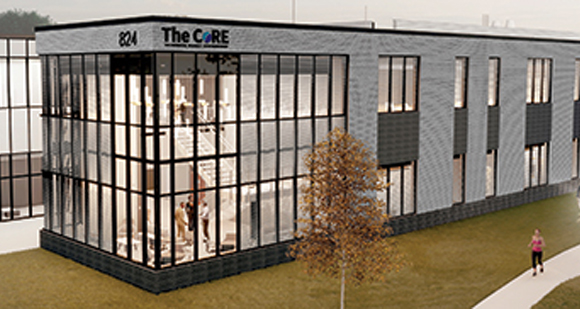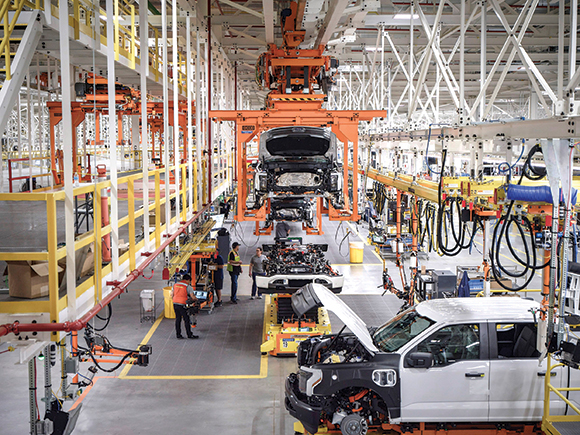|



|
FROM SITE SELECTION
MAGAZINE, MARCH 2022 ISSUE
|

|
CERTIFIED SITES
Quick updates on selected site certification programs.
|
|
|
CONWAY ANALYTICS
SNAPSHOT
|

|
It’s e-commerce week at UNCTAD, which means new data are available showing the spike in
e-commerce caused by the global pandemic did not flag in 2021, with
online sales “increasing markedly in value, despite the easing of
restrictions in many countries.” The average share of internet users who
made purchases online increased from 53% before the pandemic (2019) to
60% following the onset of the pandemic (2020/21), across 66 countries
with statistics available. The greatest rises occurred in several
developing countries.
“In the United Arab Emirates, the share of internet users who shopped
online more than doubled, from 27% in 2019 to 63% in 2020,” says UNCTAD.
“In Bahrain the share tripled, reaching 45% in 2020, and in Uzbekistan
it rose from 4% in 2018 to 11% in 2020. In Thailand, which already had a
relatively high uptake prior to the pandemic, a 16-percentage-point
increase meant that for the first time more than half of internet users
(56%) shopped online in 2020. Among developed countries, the greatest
increases were seen in Greece (up 18 percentage points), Ireland,
Hungary and Romania (each 15 percentage points). Of the 66 countries
covered, online shopping remains the lowest in El Salvador (1% of
internet users), Azerbaijan (5%), Uzbekistan (11%) and Colombia (17%),”
due in part to a lack of digital infrastructure.
The analysis from UNCTAD also points out that while we think all
e-commerce is from Amazon, there are plenty of other companies with
their fair share of transactions. As the graph below illustrates,
China’s Alibaba (helped by its logistics arm Cainiao) leads the way.
Among projects from that company tracked by the Conway Projects Database
over the past five years are a $1.5 billion complex in Hong Kong and
other warehouses in the UAE, South Korea and Russia, as well as data
centers in Indonesia, London, Mumbai and Sepang, Malaysia. The most
recent data center location is in Seoul, South Korea, where Alibaba
Cloud, like its big tech brethren, is promulgating tech
training alongside online sales. “To ensure the highest cyber protection
and compliance standards, Alibaba Cloud has more than 80 security and
compliance accreditations worldwide,” the company noted. “With our
latest facility in Korea,” said Stone Ni, country lead of South Korea,
Alibaba Cloud Intelligence, “Alibaba Cloud aims to train at least 2,000
IT professionals in this fiscal year, so the shortage of talents don’t
hinder the innovation of our customers.”
|

|
  |
|
KENTUCKY ECONOMIC
DEVELOPMENT GUIDE 2022
|

|
COMMUNITY DEVELOPMENT
Kentucky programs prepare sites for influx of business locations.
|
|
|
SITE SELECTION
RECOMMENDS
|
|
There are plenty of everyday doubts about the transition to electric
vehicles: the plunder of the planet for a new set of raw materials other
than oil; the practicality of a limited travel radius; the availability
of enough power when we have all these data centers to operate for our
e-commerce (JK, folks). This excellent map from ESRI, however, shows one
aspect that is progressing apace: The national network of charging
stations near Interstates is beginning to fill in.
|
|
|
OREGON ECONOMIC
DEVELOPMENT GUIDE
|

|
QUALITY OF LIFE
A half-dozen ways that Oregon’s boundless, natural gifts inspire body
and spirit.
|
|
  |
California
As documented by Commercial Observer and The Real Deal based on
data in a CBRE report, Amazon has signed its biggest lease ever, for 4.1
million sq. ft., in a market where Prologis just happens to be
developing a 4.1-million-sq.-ft. facility in Merrill Commerce Center, a
park expected to host more than 7 million sq. ft. of warehouse space and
a 1.2-million-sq.-ft. business park. Ontario in San Bernardino County is
known for its logistics operations, including
another recent large deal with Home Depot.
Iowa
Specialty engineered suspensions company Link Manufacturing in late
March broke ground on a new manufacturing and training facility, Plant
4, adjacent to Plant 3 on the company’s campus in Sioux Center, Iowa,
located just north of the ice cream capital of Le Mars in northwest
Iowa. “Sioux Center is located near the geographic center of the country
and keeps Link within easy reach of major transportation routes and thus
the OEMs and secondary markets we serve,” said Jim Huls, president of
the 41-year-old company. “Sioux Center has been good for Link and we
believe that Link has been good for Sioux Center. Our roots are here and
our town, our company and our customers all benefit from our Northwest
Iowa values and work ethic.” The company also operates a site in Nisku,
Alberta, Canada.
|
|

|
Ford’s Rouge Electric Vehicle Center is the first Ford plant without
traditional in-floor conveyor lines, instead using robotic Autonomous Guided
Vehicles to move F-150 Lightning trucks from one workstation to another. Photo courtesy of Ford Motor Co.
|
|
On Tuesday at its historic Rouge Complex in Dearborn, Michigan, Ford
launched production of the electric F-150 pickup. “Today we celebrate
the Model T moment for the 21st Century at the Rouge Electric Vehicle
Center,” said Ford Executive Chair Bill Ford. “The Rouge is where Ford
perfected the moving assembly line, making it a fitting backdrop as we
make history again.” Ford says it has invested a total of $950 million
and created 750 jobs at the Rouge Electric Vehicle Center. “Ford’s
investment in Michigan for F-150 Lightning alone now totals more than $1
billion,” the company explained, “with 1,700 recently created jobs
spread among five Ford plants in the state, including Van Dyke Electric
Powertrain Center, where Lightning electric motors and electric
transaxles are assembled, and Rawsonville Components Plant, where
Lightning batteries are assembled.”
|
|
|
|

